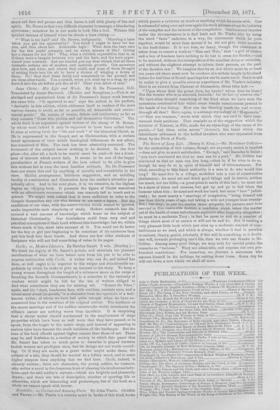which puzzle a reviewer as flinches anything which he meets
with. Ono. is aehamedof using over and over again the stock phrases about tho industry of the compiler and the interest of the compilation. One's natural impulse. under the circumstances is to find fault, and Mr. Timbs, who by using the word " facts " endorses, in a way, the statements which he puts. together, would be more than mortal if he did not give some occasion to the fault-finder. It is not true, we fancy, though the statement is taken from so recent a work as "Man and Wife," that " a girl of twelve and a boy of fourteen have nothing to do but to cross the Border,—and to be married, without the interposition of the smallest delay or restraint, and without the slightest attempt to inform their parents, on the part of the Scottish law." We imagine that by an Act which must be at least ten years old there must now be residence of a certain length in Scotland before the facilities of Scotch marriagelaw can be made use of. Butit would be unfair to give a possible error as a specimen of Mr. Timba's industry. Hero is an extract from Clement of Alexandria, about false hair :— " Upon whom does the priest, then, lay hands ? whom does he bless ? Not the woman who is so adorned, forsooth I but the hair of someone else."' We have often thought something of the kind when we have seen the monstrous erections of hair which some female catechumens present to. the hands of the bishop. How can the blessing reach the real woman through all that ? Hero, again, is e strange etymology of "Huguenots" —" Hue nos venimus," words with which they are said to have com- menced their petitions. That reminds us of the suggestion which tho minister of Tranent, in Fife, made for an etymology of the name of his parish,—" Let them swim across " (tranent), the taunt which the inhabitants addressed to tho baffled invaders who were separated frosts thorn by the Firth of Forth.


































 Previous page
Previous page